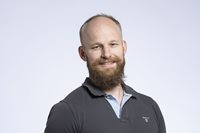Introducing radiation oncology safety and quality committee member Samuel Peters
I'm Samuel Peters, and I’m employed at St. Gallen's public hospital (Kantonsspital St. Gallen) in the northeastern part of Switzerland. I grew up in the same region and studied physics at ETH Zurich, Switzerland, from 2001 to 2006. During my final year, I came into contact with medical physics and completed my master's thesis at the Paul Scherrer Institute proton therapy facility in Villigen, Switzerland. In 2007, I started as a medical physics trainee at the St. Gallen Hospital, and I obtained certification as a trained medical physicist in 2010.
I co-lead, alongside Petra Reijnders, the cyber-attack project, which is aimed to establish guidelines or a framework to direct responses to cyber-attacks in radiation oncology departments.
As a trained medical physicist, I specialised in introducing new treatment methods into our clinical workflows, such as volumetric modulated arc therapy and stereotactic radiosurgery. Previously, I managed the record and verify system, and led a project to transition to a fully paperless clinic. In the past three years, I've shifted a bit further away from the patients to a role in which I am focused on radiation oncology informatics, overseeing clinic-specific software, designing and managing digital workflows, organising data analysis and statistics, data protection and cyber-security, and managing the overall digital transformation project with a focus on the whole patient journey.
I joined the radiation oncology safety and quality committee to contribute to the establishment of cyber-security guidelines. While I may not consider myself a complete expert in this area, I aim to provide valuable insights, driven by a personal concern that cyber-crime awareness and knowledge must be improved on how to respond to cyber-attacks in our community.
More information technology (IT) specialists are vital in radiation oncology departments. Medical physicists often assume IT-related responsibilities, but the rapid transformation to digital systems requires deep knowledge beyond that of treatment planning and verification systems. We need IT specialists in radiation oncology processes who encompass more than just software and hardware support. Detailed knowledge is required regarding how to handle clinical data and how to enhance digital processes to enhance clinical efficiency and, in the longer term, effectiveness. ESTRO should prioritise the production of guidelines on the incorporation of IT specialists into the world of radiation oncology, outline training strategies, allocate space for this topic at congresses and through teaching courses, and initiate efforts to advance digital transformation.

Samuel Peters
Kantonsspital St. Gallen
Radio-oncology clinic
CH-9007 St. Gallen, Switzerland